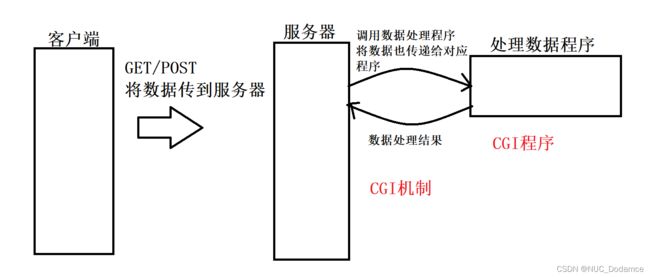Linux_网络项目_WEB服务器 处理HTTP请求构建响应、CGI
文章目录
-
- 1. 处理HTTP请求
- CGI
- 2. 完整代码
1. 处理HTTP请求
需要注意的是,在处理HTTP请求和构建HTTP响应之前,首先要判断HTTP请求的合法性。这个项目只支持POST和GET方法。
当请求非法时直接发送错误响应即可。
宏观上,客户端访问服务器有两种情况
- 从服务器上拿取资源(打开网页,下载)
- 将自己的资源上传到服务器上。(登录、注册)
将自己的资源上传到服务器上可以使用GET通过URL传参,或者POST方法通过正文传参。
而且拿到数据只是第一步,还需要进行数据处理,这里先不考虑。同时如果HTTP请求服务器可执行程序时,也需要特殊处理,这里也先不考虑。
GET通过URL传参:检测URL中是否有?即可,?左边是资源路径,右边是参数
//HTTP响应报文
class HttpResponse{
public:
std::string StatusLine_HTTP;//状态行
std::vector<std::string>ResponHeads;//首部字段
std::string ResponBlank;//空行
std::string ResponBody;//正文
int status_code=OK;//响应状态码
};
//HTTP请求报文
class HttpRequest{
public:
std::string RequestLine_HTTP;//请求行
std::vector<std::string>RequestHeads;//首部字段
std::string RequestBlank;//空行
std::string RequestBody;//正文
//解析完请求报文后的结果
std::string Method;
std::string URI;//Path?Pararm
std::string Version;
//保存解析首部字段的map
std::unordered_map<std::string,std::string>Head_KVS;
int Content_Lenth=0;
//访问资源的路径
std::string Path;
//如果是GET方法通过URL上传的参数
std::string Param;
};
//读取请求,分析请求,构建响应,基本IO通信,实现基本业务逻辑
class EndPoint{
private:
int sock;
HttpRequest http_request;//http请求
HttpResponse http_response;//http响应
public:
EndPoint(int _sock):sock(_sock){}
void MakeRespon_HTTP(){//构建响应
//判断请求类型
if(http_request.Method!="GET"&&http_request.Method!="POST"){
ERRORLOG(WARNING,"error request");
http_response.status_code=NOTFOUND;
goto END;
}
//如果是GET方法需要处理URL,看URL是否有参数
if(http_request.Method=="GET"){
size_t pos=http_request.URI.find('?');
if(pos!=std::string::npos){
Util::CutString(http_request.URI,http_request.Path,http_request.Param,"?");
}
else{
//不是通过GET传参数
http_request.Path=http_request.URI;
}
}
END:
return;
}
void SendRespon_HTTP(){//发送响应
}
~EndPoint(){}
};
之后要判断路径是否合法,路径表明了服务器上的某种资源。路径不合法时服务器也要向客户端发送错误响应。
- 路径 / 不一定指服务器系统根目录,需要自己指定web根目录(取名为wwwroot文件夹)。并且如果URL路径为 / ,系统默认返回wwwroot文件夹下的index.html网页文件。(web根目录下,只要有一个路径都需要一个index.html作为每个路径下默认网页)

所以上文中获取到URL的路径,不能直接使用,需要拼接上web根目录。
eg: /a/b/c -->wwwroot/a/b/c
才是客户端完整的请求资源路径,之后再对路径进行合法性判断。
最后结果应如下图:

判断一个路径下文件的属性:stat




同时也需要注意,这个文件无论是那个所属组,只要具备可执行都是可执行程序,都需要进行特殊处理,判断可执行需要&来判断
(m)指的是stat结构体中的st_mod字段
如果成功获得了http请求行路径的文件属性,说明这个路径是有效的。
函数执行成功返回1,失败返回-1
stat结构体中可以判断这个文件是文件夹还是文件,如果是文件夹就为HTTP请求路径添加上这个路径下的首页文件。

CGI
HTTP协议自带CGI机制,实现网站的可交互式,这种交互式需要使用CGI形式。注意CGI机制与CGI程序不同。

所以,当请求向服务器发送数据时或请求可执行程序时,需要CGI机制。这里先写出接口
2. 完整代码
#pragma once
//已经存在套接字,线程通过套接字处理任务
#include
//拼接web根目录;
tmpPath=http_request.Path;
http_request.Path=WEB_ROOT;
http_request.Path+=tmpPath;
//std::cout<<"Debug# "<
if(http_request.Path[http_request.Path.size()-1]=='/'){
//默认访问index.html
http_request.Path+=HOME_PAGE;
}
//std::cout<<"Debug# "<
//判断路径是否合法
struct stat stat_buff;
if(stat(http_request.Path.c_str(),&stat_buff)==0){
//资源存在,需要判断这个路径是否访问了路径下的某个资源,如果没有,直接将路径的默认网页响应回去
if(S_ISDIR(stat_buff.st_mode)){
//是目录
http_request.Path+="/";
http_request.Path+=HOME_PAGE;
stat(http_request.Path.c_str(),&stat_buff)
}
if((stat_buff.st_mode &S_IXUSR)||(stat_buff.st_mode &S_IXGRP)||(stat_buff.st_mode& S_IXOTH)){
//可执行文件,需要特殊处理
http_request.CGI=true;
}
}
else{
//资源不存在状态码 404
ERRORLOG(WARNING,http_request.Path+" Not Found!");
http_response.status_code=NOTFOUND;
}
if(http_request.CGI==true){
//ProceCGI();
}
else{
//ProceNoCGI();//一定是GET方法,一定不带参,简单的文本网页返回
}
END:
return;
}
void SendRespon_HTTP(){//发送响应
}
~EndPoint(){}
};
class Entry{//线程执行任务的入口
public:
static void*SolveQuest(void*_sock){
ERRORLOG(INFO,"Processing Requests...");
int sock=*(int*)_sock;
delete(int*)_sock;
//std::cout<<" Get a New Link: sock="<
EndPoint* endpoint=new EndPoint(sock);
endpoint->RecvQuest_HTTP();
endpoint->AnalyQuest_HTTP();
endpoint->MakeRespon_HTTP();
endpoint->SendRespon_HTTP();
delete endpoint;
ERRORLOG(INFO,"Processing Request End!");
return nullptr;
}
};




